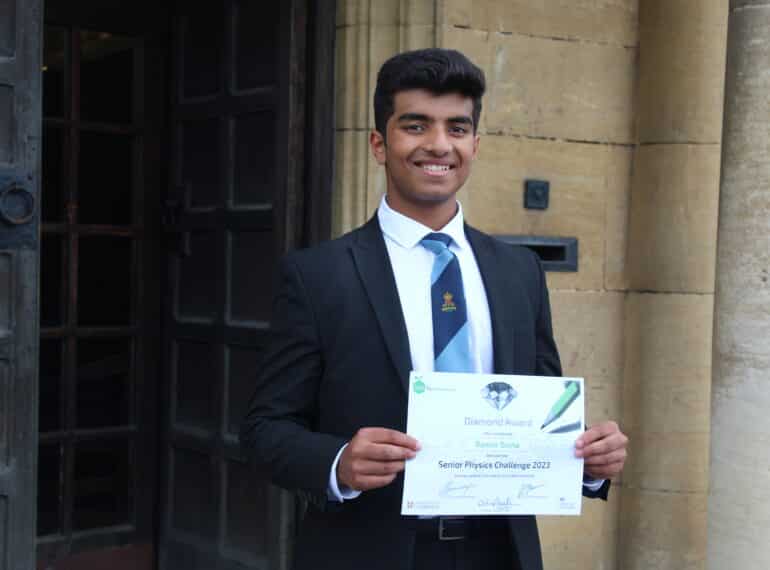
A Year 12 pupil took up a coveted place on a prestigious summer residential at Cambridge after securing a top-50 place in the Senior Physics Challenge.
Ranvir Sinha completed 586 questions up to the deadline in the online challenge run by Isaac Physics, a Department of Education project at the university. Many of the questions involved concepts usually introduced only at undergraduate level.
He joined other top-performing students at the four-day residential placement, where they were able to conduct experiments at the world-famous Cavendish Laboratory. The residential aims to give young people an idea of what it would be like to study quantum mechanics as an undergraduate.
Assistant Head (Pupil Destinations) James Kane said: “We are delighted for Ranvir – not only for his success in qualifying, but also for the opportunity he had to experience lectures which really engaged and stretched him.”
Ranvir, who won a Diamond Certificate for his élite performance, said: “I enjoyed tackling the challenges, especially the problems relating to moments of inertia, and learning the tricks that could be used to simplify them.”
Ranvir was fulsome in his praise of the residential, where he was taught by eminent lecturers such as Dr Lisa Jardine-Wright OBE (the director of Isaac Physics and a Fellow of Churchill College, Cambridge), Dr Anton Machacek (a Fellow of Fitzwilliam College, Cambridge), Dr Nicki Humphry-Baker (a Fellow of Corpus Christi College, Cambridge), who sped the cohort through advanced concepts in Physics. “My favourite was the derivation of Schrödinger’s time-independent equation; it was immensely satisfying being able to prove such a fundamental part of the quantum world,” he said.
In addition to the lectures, the visiting students worked together on groups in the Cavendish Laboratory.
Ranvir was impressed with the facilities there: “It was equipped with brilliant apparatus! My group and I conducted tests for diffraction gratings, depending on the number and shape of slits that a laser would shine through – the lasers were so impressive, as were the vibrant patterns formed on our pieces of paper.”
The competition is run annually by Isaac Physics, an Open Platform for Active Learning. It aims to offer support and resources to students transitioning from GCSE to Sixth Form and through to university. Students work through the challenges at their own pace, but to a deadline.
The website states that usually the top-performing students complete in the region of 300-350 challenges in order to qualify, with weighting giving in the rankings on the higher-level challenges that they successfully complete.
Mr Kane said: “By completing well over 500 of the challenges, some at second-year undergraduate level, Ranvir demonstrated his commitment to the subject. He certainly deserved his reward – and I am glad that he enjoyed it, too.”

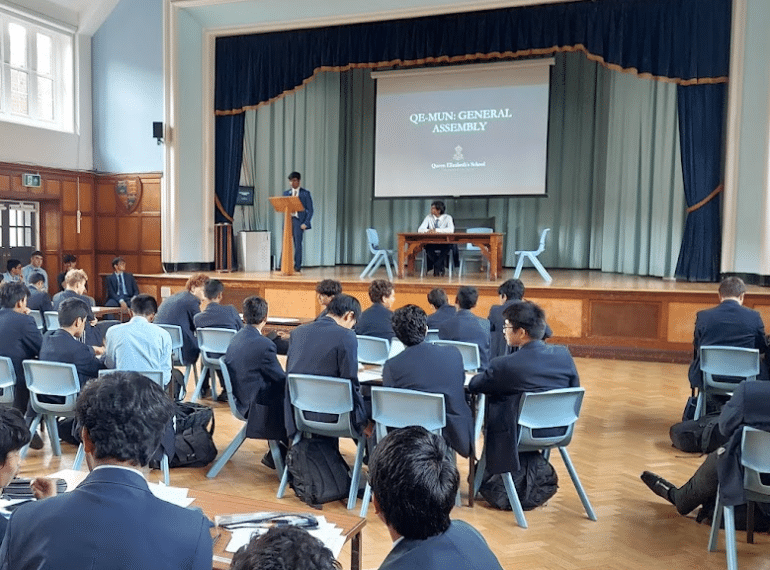
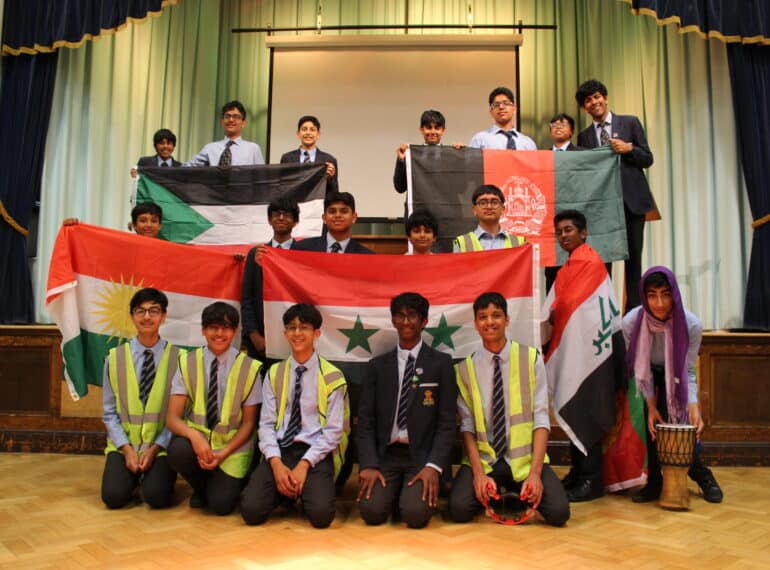
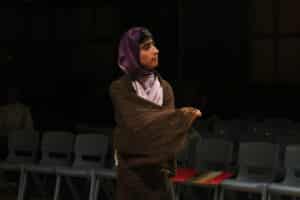 Performed during national Refugee Week, the play, which is itself called The Jungle, gave a voice to some of the thousands of men, women and children from many different countries who lived in the camp while trying to gain access to the UK.
Performed during national Refugee Week, the play, which is itself called The Jungle, gave a voice to some of the thousands of men, women and children from many different countries who lived in the camp while trying to gain access to the UK.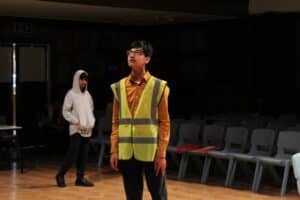 An award-winning play, The Jungle was written by two young playwrights, Joe Murphy and Joe Robinson, who met while studying English at Oxford. In the autumn of 2015, they first came to the Jungle camp, returning a short time later after crowdfunding to bring an 11m white geodesic dome there to serve as a theatre and community & arts space. They then spent seven months volunteering in the Jungle, before the authorities took down the encampment in 2016.
An award-winning play, The Jungle was written by two young playwrights, Joe Murphy and Joe Robinson, who met while studying English at Oxford. In the autumn of 2015, they first came to the Jungle camp, returning a short time later after crowdfunding to bring an 11m white geodesic dome there to serve as a theatre and community & arts space. They then spent seven months volunteering in the Jungle, before the authorities took down the encampment in 2016. Aahan said: “Playing the role of someone who has been far less privileged than myself and has had many different experiences has been really interesting. Additionally, the character I played weaves himself in and out of the story, as if controlling it and the perspective, which was something really challenging but also really fun!”
Aahan said: “Playing the role of someone who has been far less privileged than myself and has had many different experiences has been really interesting. Additionally, the character I played weaves himself in and out of the story, as if controlling it and the perspective, which was something really challenging but also really fun!”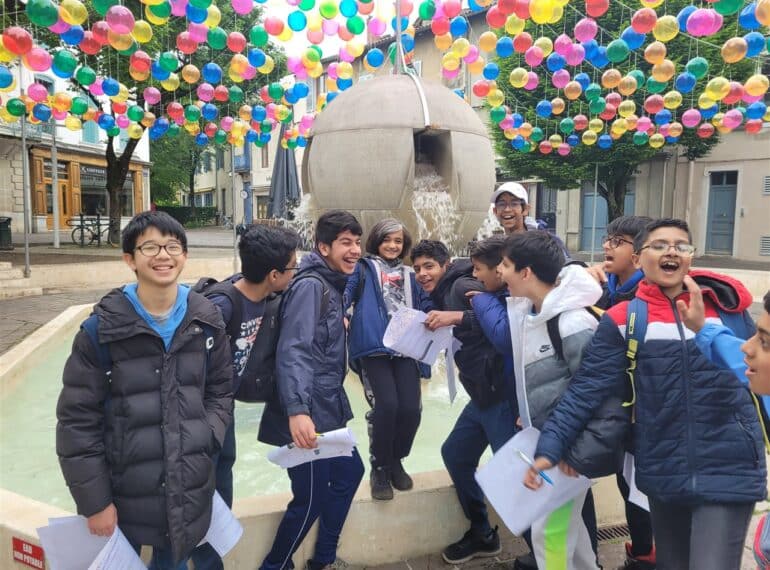
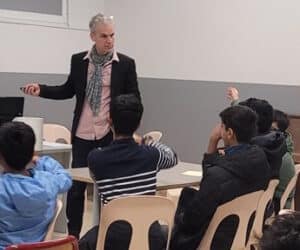 Twenty-one boys headed to Bourg-en-Bresse this month, a town which lies northeast of Lyon at the foot of the Jura Mountains. Their exchange partners came to Barnet last term.
Twenty-one boys headed to Bourg-en-Bresse this month, a town which lies northeast of Lyon at the foot of the Jura Mountains. Their exchange partners came to Barnet last term. The first exchange with Bourg-en-Bresse was in the 2010 Summer Term, when 13 pupils from Years 8 and 9 visited Collège St-Pierre, the alma mater of a QE French teacher of the time, Océane Jullien, who now teaches in Thailand.
The first exchange with Bourg-en-Bresse was in the 2010 Summer Term, when 13 pupils from Years 8 and 9 visited Collège St-Pierre, the alma mater of a QE French teacher of the time, Océane Jullien, who now teaches in Thailand. Visit to the local ‘parc des oiseaux’ (bird park) with their partners
Visit to the local ‘parc des oiseaux’ (bird park) with their partners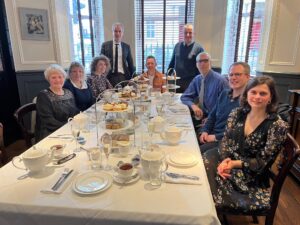 Fellow member of Harrisons’ House, Aaryav Sharma, said some of his most memorable moments took place above ground level: “We had a great afternoon doing accrobranche, which is a treetop adventure activity,” adding that he and two friends all “managed the really difficult black run, which was great!”
Fellow member of Harrisons’ House, Aaryav Sharma, said some of his most memorable moments took place above ground level: “We had a great afternoon doing accrobranche, which is a treetop adventure activity,” adding that he and two friends all “managed the really difficult black run, which was great!”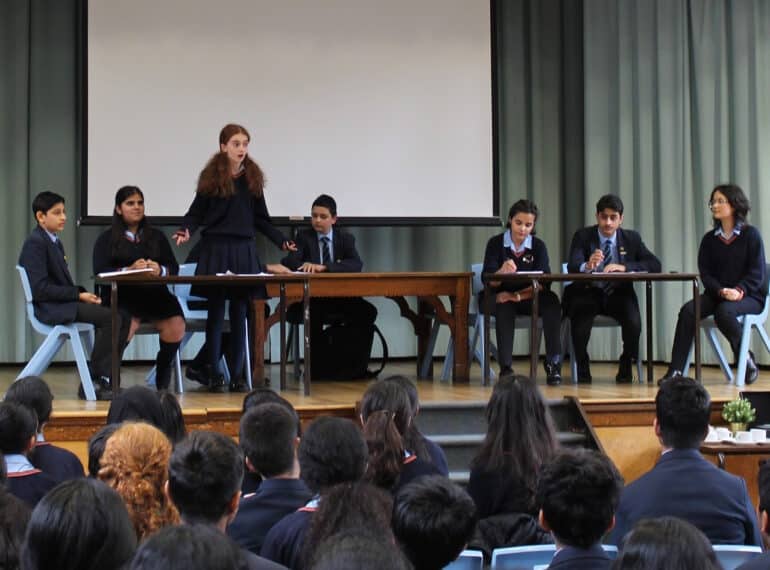
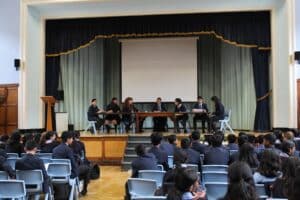 After the initial quickfire rounds, the morning with the guests from The Henrietta Barnett School (HBS) culminated in a final impassioned debate on the motion This House believes it was right to arrest the protesters at the King’s coronation.
After the initial quickfire rounds, the morning with the guests from The Henrietta Barnett School (HBS) culminated in a final impassioned debate on the motion This House believes it was right to arrest the protesters at the King’s coronation.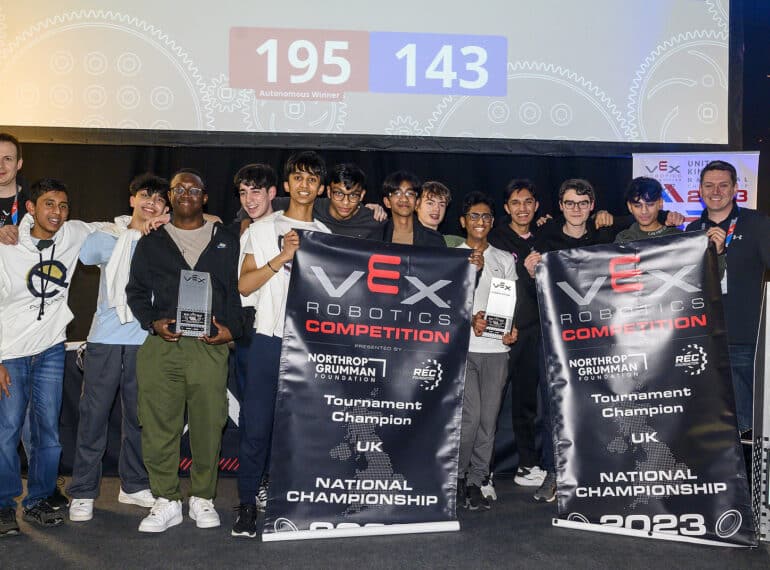
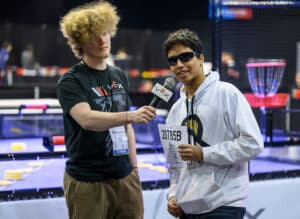 This year, QE sent six teams to the VRC National Championships at Telford International Centre for the first time. With six junior teams also making the journey, Queen Elizabeth’s School had more teams at the national finals than any other organisation.
This year, QE sent six teams to the VRC National Championships at Telford International Centre for the first time. With six junior teams also making the journey, Queen Elizabeth’s School had more teams at the national finals than any other organisation.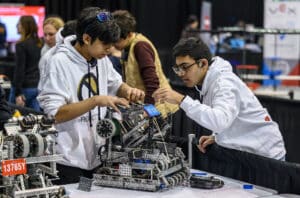 The QE boys benefitted from the support of corporate sponsor, Kingston Technology, sporting QE hoodies bearing the Kingston logo.
The QE boys benefitted from the support of corporate sponsor, Kingston Technology, sporting QE hoodies bearing the Kingston logo.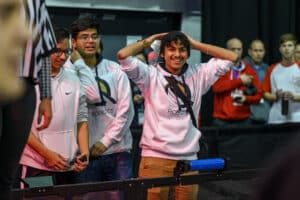 As the final stages progressed, high-performing QE sides found themselves facing each other, with Typhoon defeating Shattersquad in a Lovelace quarter-final and Nova beating Hybrid in a Brunel semi-final.
As the final stages progressed, high-performing QE sides found themselves facing each other, with Typhoon defeating Shattersquad in a Lovelace quarter-final and Nova beating Hybrid in a Brunel semi-final.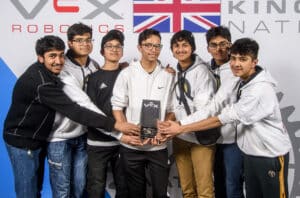 It was not to be, however. After a complicated series of events started when illegal parts were spotted on another team’s robot, Typhoon had to battle against the disadvantage of having to disable part of their own robot. They fought bravely alongside their alliance partner, but in the end, lost their deciding game by a single point, 133-134. “Divisional runners up, their pride was still intact and they learned a great deal from this experience,” said Mr Noonan.
It was not to be, however. After a complicated series of events started when illegal parts were spotted on another team’s robot, Typhoon had to battle against the disadvantage of having to disable part of their own robot. They fought bravely alongside their alliance partner, but in the end, lost their deciding game by a single point, 133-134. “Divisional runners up, their pride was still intact and they learned a great deal from this experience,” said Mr Noonan.